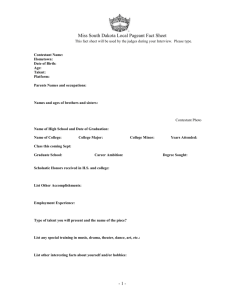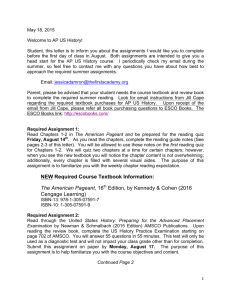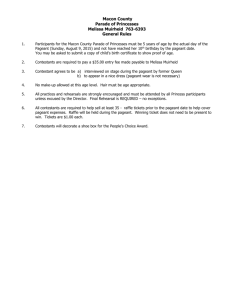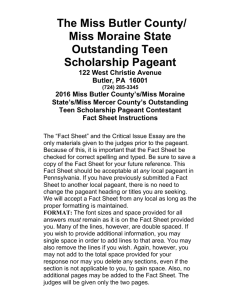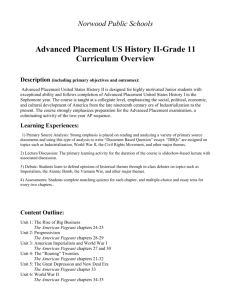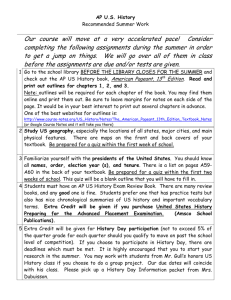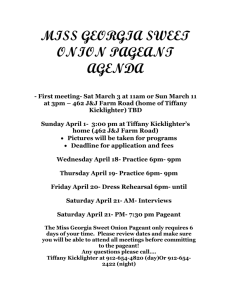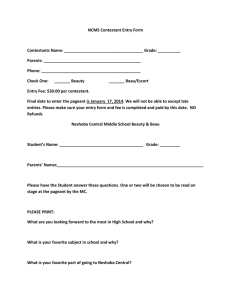AP United States History - Great Valley School District
advertisement
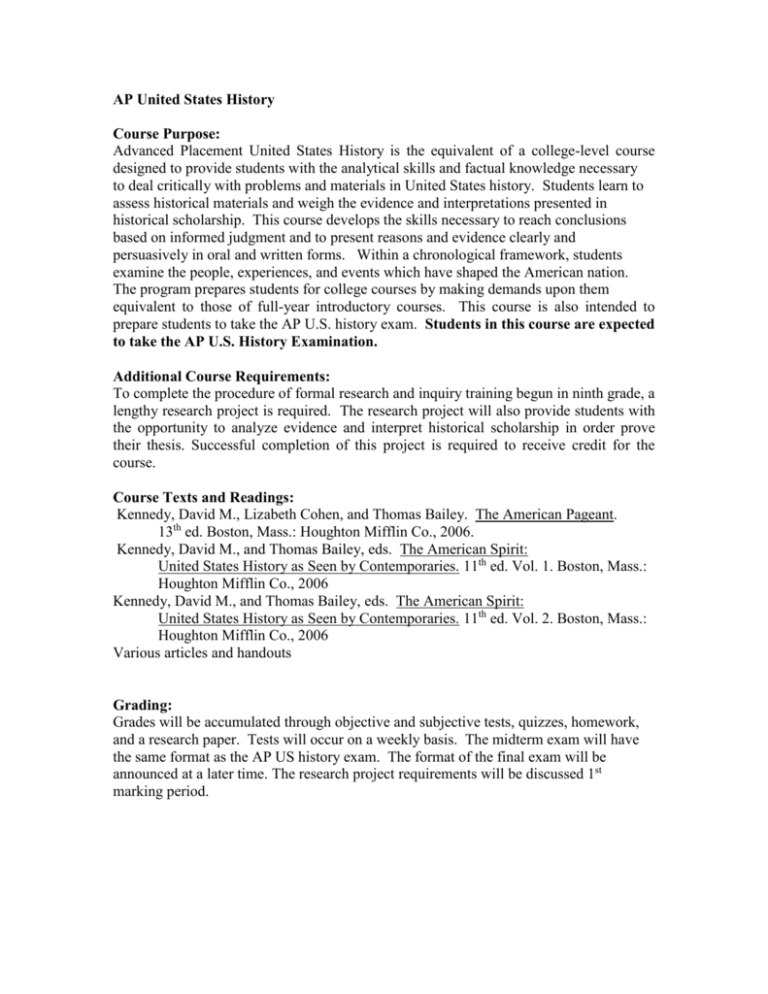
AP United States History Course Purpose: Advanced Placement United States History is the equivalent of a college-level course designed to provide students with the analytical skills and factual knowledge necessary to deal critically with problems and materials in United States history. Students learn to assess historical materials and weigh the evidence and interpretations presented in historical scholarship. This course develops the skills necessary to reach conclusions based on informed judgment and to present reasons and evidence clearly and persuasively in oral and written forms. Within a chronological framework, students examine the people, experiences, and events which have shaped the American nation. The program prepares students for college courses by making demands upon them equivalent to those of full-year introductory courses. This course is also intended to prepare students to take the AP U.S. history exam. Students in this course are expected to take the AP U.S. History Examination. Additional Course Requirements: To complete the procedure of formal research and inquiry training begun in ninth grade, a lengthy research project is required. The research project will also provide students with the opportunity to analyze evidence and interpret historical scholarship in order prove their thesis. Successful completion of this project is required to receive credit for the course. Course Texts and Readings: Kennedy, David M., Lizabeth Cohen, and Thomas Bailey. The American Pageant. 13th ed. Boston, Mass.: Houghton Mifflin Co., 2006. Kennedy, David M., and Thomas Bailey, eds. The American Spirit: United States History as Seen by Contemporaries. 11th ed. Vol. 1. Boston, Mass.: Houghton Mifflin Co., 2006 Kennedy, David M., and Thomas Bailey, eds. The American Spirit: United States History as Seen by Contemporaries. 11th ed. Vol. 2. Boston, Mass.: Houghton Mifflin Co., 2006 Various articles and handouts Grading: Grades will be accumulated through objective and subjective tests, quizzes, homework, and a research paper. Tests will occur on a weekly basis. The midterm exam will have the same format as the AP US history exam. The format of the final exam will be announced at a later time. The research project requirements will be discussed 1st marking period. Course Themes: Each of the following themes, as determined by the College Board, will be highlighted throughout Units 1-6 to aid students in their examination of people, experiences, and events which have shaped the American nation. American Diversity American Identity Culture Demographic Changes Economic Transformations Environment Globalization Politics and Citizenship Reform At the end of the course students will be expected to write about these themes in further detail on their final examination. Course Outline: Unit 1: Founding the New Nation c.33, 000 B.C.-A.D. 1783 (5 Weeks) Readings: (All assigned readings should be read by Monday of the week that the chapter will be discussed. Schedule to be handed out on the first day of school) Chapters 1-8 from American Pageant Various primary sources from Chapter 1-8 of The American Spirit Lecture: Historiography-Consensus vs. Conflict Films: Scenes from Last of the Mohicans Content: (early 16th Century-1783) The age of discovery The development of the American colonies The struggle between Britain and France over the New World The causes of the American Revolution The American Revolution Major Assignments and Assessments: Summer Assignment 1. Students will choose a book relating to American history, from a prepared list, to read and to complete a written book review. 2. Students will read the Chapters 1-3 of the American Pageant Students will take notes and complete the Identifications for these chapters. Students should be prepared for a test on these three chapters the first week of school. Workbook-Chapters 1-8 of the American Pageant Guidebook (Specific sections to be determined) “Varying Viewpoints” from American Pageant and the American Pageant Instructor’s Resource Guide- Students will read and answer questions on issues of historical interpretation and disagreement. “Europeanizing America or Americanizing Europe?” Thomas J. Wertenbaker, The Founding of American Civilization (1938)/ Gary Nash, Red, White, and Black: The People of Early America (1974). “Colonial America: Communities of Conflict or Consensus?” Richard Bushman, From Puritan to Yankee (1967)/ Gary Nash, The Urban Crucible (1979). “Whose Revolution” Research Paper- Students will begin the research process for the 12-15 page paper that will be due during the 4th marking period. After students spend three days in the library they will be required to turn in a preliminary thesis. Tests- Chapter tests will occur on a weekly basis. Students will receive a test schedule on the first day of school. A Unit test will occur at the completion of Chapters 1-8. DBQs: The Transformation of Colonial Virginia, 1606-1700 English-Indian Relations, 1600-1700 Unit 2: Building the New Nation 1776-1860 (7 Weeks) Readings: (All assigned readings should be read by Monday of the week that the chapter will be discussed. Schedule to be handed out on the first day of school) Chapters 9-15 of American Pageant Various primary sources from Chapters 9-19 of the American Spirit Content: (1776-1860) The Articles of Confederation The framing of the Constitution Jeffersonians Hamiltonians Marshall Supreme Court The War of 1812 Era of Good Feelings The development of national and sectional economies The age of reform: Jacksonian Democracy Monroe Doctrine Territorial Expansion Major Assignments and Assessments: Workbook-Chapters 9-15 of the American Pageant Guidebook (Specific sections to be determined) “Varying Viewpoints” from American Pageant and the American Pageant Instructor’s Resource Guide- Students will read and answer questions on issues of historical interpretation and disagreement. “The Constitution: Revolutionary or Counterrevolutionary?” Charles Beard, An Economic Interpretation of the Constitution (1913)/ Gordon Wood, The Creation of the American Republic (1969). “What was the Jacksonian Democracy?” Arthur M. Schlesinger, Jr., The Age of Jackson (1945)/ Lee Benson, The Concept of Jacksonian Democracy: New York a Test Case (1961). “Reform: Who? What? How? And Why?” David Donald, Lincoln Reconsidered (1956)/ Nancy Cott, The Bonds of Womanhood: “Women’s Sphere” in New England, 1780-1835 (1977). Research Paper- Working Bibliography due (Date TBA) Tests- Chapter tests will occur on a weekly basis. Students will receive a test schedule on the first day of school. A Unit test will occur at the completion of Chapters 9-15. DBQs: Thomas Jefferson and the Philosophical Consistency, 1790-1809 The Changing Place of Women, 1815-1860 Unit 3: Testing the New Nation 1820-1877 (6 Weeks) Readings: (All assigned readings should be read by Monday of the week that the chapter will be discussed. Schedule to be handed out on the first day of school) Chapters 16-22 from the American Pageant Various primary sources from the American Spirit Films: Scenes from Glory Content: (1820-1877) Manifest Destiny Slavery Sectionalism The road to war The American Civil War Reconstruction Major Assignments and Assessments: Workbook-Chapters 16-22 of the American Pageant Guidebook (Specific sections to be determined) “Varying Viewpoints” from American Pageant and the American Pageant Instructor’s Resource Guide- Students will read and answer questions on issues of historical interpretation and disagreement. “What was the True Nature of Slavery?” Stanley Elkins, Slavery (1959)/ Eugene Genovese, Roll, Jordan, Roll (1972). “The Civil War: Repressible or Irrepressible” Charles and Mary Beard, The Rise of American Civilization (1927)/ David M. Potter, The Impending Crisis, 1848-1861 (1976)/ Michael Holt, Forging a Majority: The Formation of the Republic Party in Pittsburgh, 1848-1860 (1969). “What were the Consequences of the Civil War?” T. Harry Williams, Lincoln and His Generals (1952)/ Allan Nevins, The War for the Union (1971)/ Thomas C. Cochran, “Did the Civil War Retard Industrialization?” Mississippi Valley Historical Review (1961)/ James McPherson, Battle Cry of Freedom (1988). “How Radical Was Reconstruction?” William A. Dunning, Reconstruction: Political and Economic (1907)/ Kenneth Stampp, The Era of Reconstruction (1965). Tests- Chapter tests will occur on a weekly basis. Students will receive a test schedule on the first day of school. A Unit test will occur at the completion of Chapters 16-22. DBQs: Slavery and Sectional Attitudes, 1830-1860 Abraham Lincoln and the Struggle for Union and Emancipation, 1861-1865 Unit 4: Forging and Industrial Society 1869-1909 (5 Weeks) Readings: (All assigned readings should be read by Monday of the week that the chapter will be discussed. Schedule to be handed out on the first day of school) Chapters 23-27 from the American Pageant Various primary sources from the American Spirit Films: A Man, A Plan, A Canal, Panama Content: (1869-1909) Post-Civil War economic and social developments The agricultural revolution The Granger movement The rise and decline of the Populists Territorial Expansion Creating a Global Empire Major Assignments and Assessments: Workbook-Chapters 23-27 of the American Pageant Guidebook (Specific sections to be determined) “Varying Viewpoints” from American Pageant and the American Pageant Instructor’s Resource Guide- Students will read and answer questions on issues of historical interpretation and disagreement. “The Populists: Radicals or Reactionists?” Richard Hofstadter, The Age of Reform (1955)/ Lawrence Goodwyn, Democratic Promise: The Populist Movement in America (1976). “Industrialization: Boon or Blight?” Mathew Josephson, The Robber Barons: The Great American Capitalists, 18611901 (1934)/ Herbert Gutman, Work, Culture, and Society in Industrializing American (1976). “Was the West Really Won?” Frederick Jackson Turner, “The Significance of the Frontier in American History” (1893)/ Richard White, The Middle Ground (1991). “Why Did America Become a World Power?” Julius Pratt, Expansionists of 1898 (1951)/ William Appleman Williams, The Tragedy of American Diplomacy (1959). Tests- Chapter tests will occur on a weekly basis. Students will receive a test schedule on the first day of school. A Unit test will occur at the completion of Chapters 23-27. DBQs: The Role of Capitalists, 1875-1900 The Farmers’ Movement, 1875-1900 Unit 5: Struggling for Justice at Home and Abroad 1901-1945 (6 Weeks) Readings: (All assigned readings should be read by Monday of the week that the chapter will be discussed. Schedule to be handed out on the first day of school) Chapters 28-35 from the American Pageant Various primary sources from the American Spirit Films: Cinderella Man, Saving Private Ryan Content: (1901-1945) The progressives in power The road to World War I and U.S. involvement Political conservatism ascendant The 1st Red Scare The Harlem Renaissance Other cultural development during the roaring twenties The Great Depression The New Deal World War II and the end of U.S. neutrality Major Assignments and Assessments: Workbook-Chapters 28-35 of the American Pageant Guidebook (Specific sections to be determined) “Varying Viewpoints” from American Pageant and the American Pageant Instructor’s Resource Guide- Students will read and answer questions on issues of historical interpretation and disagreement. “Who Were the Progressives? Richard Hofstadter, The Age of Reform (1955)/ Gabriel Kolko, The Triumph of Conservatism (1963)/ Robert Wiebe, The Search for Order, 1877-1920 (1967). “Woodrow Wilson: Relist or Idealist?” George Kennan, American Diplomacy (1950)/ Arthur Link, Wilson the Diplomatist (1957). “How Radical Was the New Deal?” Arthur M. Schlesinger, Jr., The Age of Roosevelt: The Coming of the New Deal (1959)/ William E. Leuchtenberg, Franklin D. Roosevelt and the New Deal (1963). “The Atomic Bombs: Were They Justified?” Gar Alperovtiz, Atomic Diplomacy (rev. ed., 1985)/ Martin Sherwin, A World Destroyed (1975). Research Paper- Rough Drafts Due (Date TBA) Tests- Chapter tests will occur on a weekly basis. Students will receive a test schedule on the first day of school. A Unit test will occur at the completion of Chapters 28-35. DBQs: The United States as World Power, 1895-1920 Foreign Policy, 1930-1941 Unit 6: Making Modern American 1945 to the Present (5 Weeks) Readings: (All assigned readings should be read by Monday of the week that the chapter will be discussed. Schedule to be handed out on the first day of school) Chapters 36-42 from the American Pageant Various primary sources from the American Spirit Content: (1945-Present) The origins of the Cold War The intensifications of Cold War hostilities Containment policy in Europe and Asia The 2nd Red Scar McCarthyism Cold War becomes hotter Transformation of American Culture Civil Rights Movement The Great Society Resurgence of conservatism The end of the Cold War The challenges of the contemporary world Major Assignments and Assessments: Workbook-Chapters 36-42 of the American Pageant Guidebook (Specific sections to be determined) “Varying Viewpoints” from American Pageant and the American Pageant Instructor’s Resource Guide- Students will read and answer questions on issues of historical interpretation and disagreement. “Who Was to Blame for the Cold War?” Walter LaFeber, America, Russia, and the Cold War, 1945-1984 (1985)/ John Lewis Gaddis, The United Sates and the Origins of the Cold War (1972). “The Sixties: Constructive or Destructive?” Todd Gitlin, The Sixties: Years of Hope, Days of Rage (1987)/ William O’Neil, Coming Apart (1971). “Where Did Modern Conservatism Come From?” Daniel Bell, ed., The Radical Right (1963)/ Kevin Phillips, Post-Conservative America (1982). Tests- Chapter tests will occur on a weekly basis. Students will receive a test schedule on the first day of school. Due to the AP Exam there will be no unit test for Unit 6. DBQs: Conformity and Turbulence, 1950-1970 The Resurgence of Conservatism, 1964-2000 Unit 7: Review (1-2 Weeks) Students will spend the remaining class periods prior to the AP Exam reviewing for the test. This will be done through practice tests and content review sessions. Unit 8: Hollywood and History (4 Weeks) Major Assignments and Assessments: Research Project- Final Copy Due (Date TBA)
